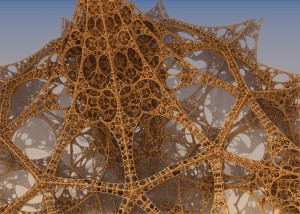Idriss Aberkane
Botcrafting and Botbreeding : A Simplified Economics of Evolutionary Algorithms
Abstract : Let us consider the industrial and economic impact of genetic programming and its generic availability to the masses. Is the interaction between genetic programming and the so-called “cognitariat” the beginning of a “genetic revolution” in the industrial sense ? Can we theorise a genetic marketplace, based on the dynamic of bids and asks for genetic algorithms to be made-to-order and leverage any daily routine, thus trading value ? Can genetic algorithms be crossbred to achieve a phenomenon similar to animal domestication, with a transition from wild to domestic type and heterosis, and can such a pressure for domestication percolate to macroeconomic value ? Which economic marketplace would allow such an economic phenomenon to happen and percolate least impeded ? Here I consider the economic implication of evolving genetic algorithms to address any repetitive human task, within a grand genetic marketplace composed of bidders and askers that would be using, evolving and breeding genetic programs (“bots”) and manipulating them as “bot breeders” to leverage their own economic output. I define a cryptocurrency on the buyer’s side, conceived to represent a unit of genetic purchasing power, which I call a “botcoin”.
Keywords :Knowledge Economy, bitcoin, botcoin, evolutionary algorithms, self-organisation, theory of value.
Résumé : Considérons l’impact économique et industriel de la programmation génétique et de sa disponibilité générique auprès des masses. L’interaction entre la programmation génétique et le “cognitariat” est-elle le début d’une “révolution génétique” dans le sens industriel ? Pouvons-nous théoriser un marché génétique, basé sur la dynamique de l’offre et de la demande, dans lequel des algorithmes génétiques seraient assemblés à la commande pour démultiplier n’importe quelle routine quotidienne, et ainsi représenter une valeur commerciale ? Les algorithmes génétiques peuvent-ils être croisés dans une dynamique comparable à la domestication, avec une transition du sauvage au domestique, et des phénomènes d’hétérosis ? Une telle pression de domestication peut-elle percoler en une valeur macroéconomique remarquable ? Quel modèle de marché pourrait permettre un tel phénomène économique d’exister le plus facilement possible ? Je considère ici les implications économiques du métier consistant à évoluer des algorithmes pour automatiser n’importe quelle tâche humaine répétitive, dans le cadre d’un marché génétique composé d’acheteurs et de vendeurs qui élèveraient et sélectionneraient des programmes (“bots”) et les manipuleraient comme des “éleveurs” pour maximiser leur productivité économique. Je définis également une cryptodevise côté acheteur, conçue pour représenter une unité de pouvoir d’achat génétique, le “botcoin”.
Mots-clés : Economie de la Connaissance, bitcoin, botcoin, algorithme évolutionnaire, auto-organisation, théorie de la valeur.


